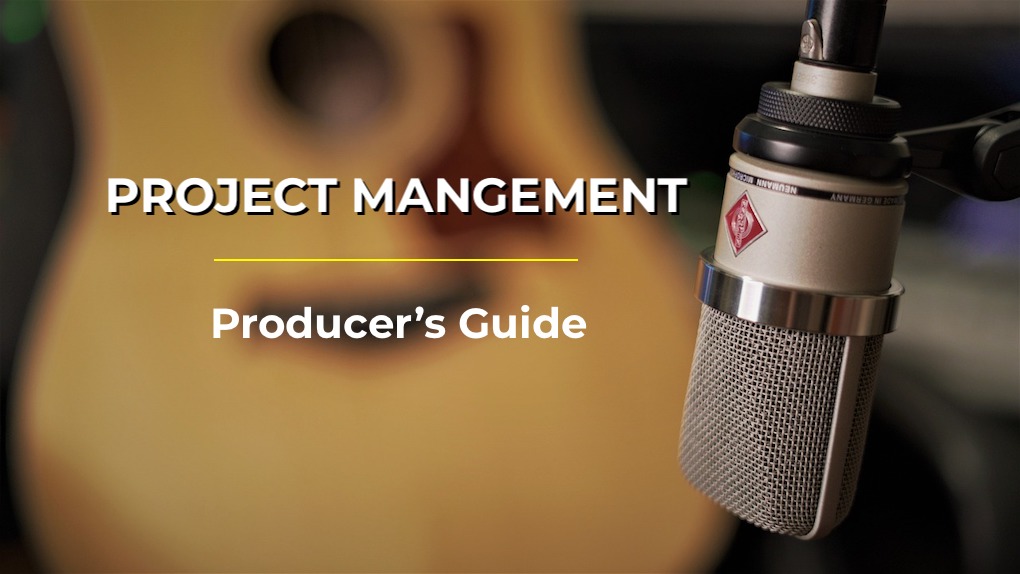- in Production by Bobby Owsinski
The Producer’s Guide To Project Management
Project management is the one element that usually slips beneath the radar of most budding producers, but it can easily break you if you don’t pay attention to it. Project management consists of the planning, organizing, and managing of the resources necessary to the complete the project, be it just one song, a cue or jingle, or a full ten-song album.

Most projects, even those of superstar acts, have a timeline that must be followed since the days of open-ended recording sessions are pretty much over thanks to marketing campaigns and tours that are developed before the record is even completed (and sometimes started). This means that all the time elements of your project have to be planned out well in advance, with a little leeway built in as needed.
Managing Time
Managing both project time and people time is one of the more difficult jobs of a producer, since it involves a lot of educated guessing. You never really know exactly how much time any one segment will take, but you do have a general idea if you’ve done your production homework.
So how do you figure out how much time you’ll need? Just like any project in any company, you make a timeline that includes specific milestones, while leaving a little leeway in case the unforeseen happens.
- Take stock of the situation. Let’s say that the record label wants to have the project delivered to them by October 1, and you’re asked to participate on the project on May 15. There’s no way that you can determine just how long each project segment will take until you evaluate the songs, listen to the demos, listen to any previous recordings, hear the artist or band live or in rehearsal, and generally get a good feel for what’s possible and how much will need to be fixed or tweaked. This evaluation period might take a week or two, but it could be compressed into as little as a day if necessary, depending on your experience in these situations and the quality of the songs and players.
- Approximate how long each project segment will take. After you evaluate the artist’s or band’s songs and get a feel for the arrangements and how well the artists play them, you can determine how much preproduction time it will take to get everything into shape. You might determine that you’ll need a month of preproduction because the arrangements are weak, or maybe just a few days for some song tweaks. If you don’t have that kind of time or the artist is resistant to more rehearsal, then you’ll have to allot more time for basic tracking, maybe an extra day for each song, instead of the two or three songs per day that you might expect if everything is finely tuned.
During preproduction, you’ll also get a feel for what kind of overdubs you’ll be doing and what kind of time for experimentation you’ll need. Unless most of what you’re recording during tracking is a keeper, you should plan on spending at least a day for each instrument to do all the overdubs. This means that you’ll record all bass fixes for all the songs one day, one day for guitars, one for lead vocals, and so on. If you have more time and your budget permits, you would stretch that out to a day to record the lead vocal for each song (ten songs in ten days), a day of guitar fixes from the basic tracks, a day for guitar overdubs, a day for guitar solos, a day for background vocals for each song, a day for percussion for all songs, and so on. Ultimately, overdub time will be determined by the number of overdubs that you have in mind, their difficulty, and the skill sets of the players and singers. Having better players means being able to do faster overdubs.
Develop your milestones. To keep the project management on track, first, work backward from your delivery or completion date. You now plug in the time allotted for mastering, mixing, doing overdubs, tracking, and having preproduction. From there you can put in your milestones for completion.
For instance,
Preproduction start: May 21
Preproduction complete: June 7
Tracking start: June 10
Tracking complete: June 17
Bass fixes: June 20
Guitar fixes: June 21
Guitar overdubs: June 22–29
Guitar solos: June 30
Keyboard overdubs start: August 1
Keyboard overdubs complete: August 7
Lead vocals start: August 8
Lead vocals complete: August 18
Background vocals start: August 20
Background vocals complete: September 1
Percussion overdubs: September 3
Extra: September 5–10
Mixing start: September 11
Mixing complete: September 26
Listening session: September 28
Mastering: September 30
Delivery: October 1
Notice the extra days in between preproduction and tracking, tracking and fixes, lead vocals and background vocals, background vocals and percussion, plus the extra days built into the schedule. This is to make sure that there’s plenty of leeway should something take longer than anticipated or unforeseen circumstances arise.
As you can see, project management is the key to keeping everything on track. When you do that, you’ll bring the project in on-time and on-budget, and that will make your client very happy.
You can read more from The Music Producer’s Handbook and my other books on the excerpt section of bobbyowsinski.com.

